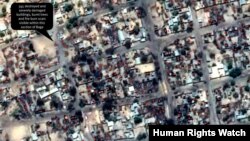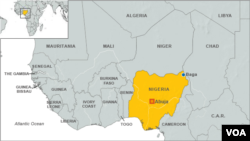ABUJA, NIGERIA —
Human Rights Watch says satellite analysis of the northern Nigerian town of Baga proves that thousands of homes were destroyed during a battle that killed hundreds in April. The organization says the analysis undermines the military’s claim that there was far less destruction and calls for a government investigation.
The battle or massacre - depending on who you ask - in the remote northern fishing town of Baga was on April 16 but it didn’t make the news for nearly a week. And even then it was believed to have happened on the 19th.
Credible sources across Nigeria still disagree on what happened. New York-based Human Rights Watch has now joined the debate, presenting satellite imagery that compares Baga before and after the violence.
Human Rights Watch says analysis of the pictures shows nearly 2,300 homes were burnt down even though the military said only 30 homes were burnt. The organization says it is concerned the military is trying to cover up human rights abuses.
The military has maintained that 36 people were killed after Boko Haram insurgents attacked, killing a soldier. Most of the casualties, they say, were members of Boko Haram, which has been conducting violent operations for nearly four years.
Maina Maaji Lawan, a Nigerian senator that represents Baga and is from the town, visited the gravesites over the weekend and said that more than 200 people had been killed and thousands of people were still displaced.
“After physically visiting it, what I have seen is far, far, far more than the reports we received," said Lawan. "The level of destruction of houses I would not put it at anything less than 4,000.”
More concerning than the conflicting reports, he says, is that aid agencies don’t have enough resources to care for the living victims.
“The magnitude of the need has overwhelmed them," said Lawan. "They have reported that themselves. I have seen it. NEMA (the National Emergency Management Agency) and Red Cross and these aid agencies say they need doctors. There was not one single medical doctor there.”
The Human Rights watch report also details individual witness accounts. In one account, a 32-year-old fisherman says soldiers told the people they were not cooperating with security forces in the battle against Boko Haram and were therefore all suspect.
Human Rights Watch says 3,600 people have been killed in Boko Haram-related violence, including hundreds killed by security forces. The organization says thousands more people have been arrested and many have been held without charges in inhumane conditions.
Locals in Borno State, the original home of Boko Haram, have long complained that they live in fear of both Boko Haram and security forces. They say if Boko Haram suspects a person of loyalty to security forces, or vice-versa, that person is likely to be killed.
Abdulkareem Haruna contributed to this report from Maiduguri
The battle or massacre - depending on who you ask - in the remote northern fishing town of Baga was on April 16 but it didn’t make the news for nearly a week. And even then it was believed to have happened on the 19th.
Credible sources across Nigeria still disagree on what happened. New York-based Human Rights Watch has now joined the debate, presenting satellite imagery that compares Baga before and after the violence.
Human Rights Watch says analysis of the pictures shows nearly 2,300 homes were burnt down even though the military said only 30 homes were burnt. The organization says it is concerned the military is trying to cover up human rights abuses.
The military has maintained that 36 people were killed after Boko Haram insurgents attacked, killing a soldier. Most of the casualties, they say, were members of Boko Haram, which has been conducting violent operations for nearly four years.
Maina Maaji Lawan, a Nigerian senator that represents Baga and is from the town, visited the gravesites over the weekend and said that more than 200 people had been killed and thousands of people were still displaced.
“After physically visiting it, what I have seen is far, far, far more than the reports we received," said Lawan. "The level of destruction of houses I would not put it at anything less than 4,000.”
More concerning than the conflicting reports, he says, is that aid agencies don’t have enough resources to care for the living victims.
“The magnitude of the need has overwhelmed them," said Lawan. "They have reported that themselves. I have seen it. NEMA (the National Emergency Management Agency) and Red Cross and these aid agencies say they need doctors. There was not one single medical doctor there.”
The Human Rights watch report also details individual witness accounts. In one account, a 32-year-old fisherman says soldiers told the people they were not cooperating with security forces in the battle against Boko Haram and were therefore all suspect.
Human Rights Watch says 3,600 people have been killed in Boko Haram-related violence, including hundreds killed by security forces. The organization says thousands more people have been arrested and many have been held without charges in inhumane conditions.
Locals in Borno State, the original home of Boko Haram, have long complained that they live in fear of both Boko Haram and security forces. They say if Boko Haram suspects a person of loyalty to security forces, or vice-versa, that person is likely to be killed.
Abdulkareem Haruna contributed to this report from Maiduguri













